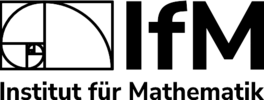Study and career
Vocational preparation elements of the study programme
Single-subject Bachelor
The mathematics degree programme imparts professionally relevant competences such as the ability to abstract, to penetrate complex content and to solve problems. Additional career-preparing elements of the study programme are combined in the so-called professionalisation area. A total of 60 credit points (CP) are to be acquired in the professionalisation area. Of these, 15 CP are allotted to the Bachelor's thesis in the 6th semester and 15 CP to mathematical internships. Possible components of the mathematical practical courses are a programming course (of any programming language or also a more specialised mathematical software such as Maple or Matlab), non-university practical courses or within the university events such as the statistical practical course. Supervision of exercise groups as a tutor can also be credited as an internship. Of the further 30 CP, 12 CP must be acquired in a mathematical focus, i.e. selected from the specialisation modules. The remaining 18 CP can be chosen completely freely. Possible options include language courses or interdisciplinary orientation events (e.g. sustainability and economics or philosophy and society). However, there are also courses that are closer to the subject: It is recommended to attend the module Mathematical Problem Solving and Proof, which should be taken as early as possible in the degree programme. Other subject-related courses are History of Mathematics or Applied Statistics.
Dual-subject Bachelor
In the dual-subject Bachelor's programme, future teachers receive in-depth insights into the content and ways of thinking in mathematics that also shape school mathematics in the mathematics lectures. In an introduction to the didactics of mathematics, they reflect on principles of learning and teaching mathematics. The professionalisation area for the Bachelor's degree mainly includes courses from education, psychology, philosophy and sociology, which are compulsory for students who want to become teachers. In addition, there are optional courses that examine individual subjects from a social perspective. In addition, two internships have to be completed, one of which takes place in school, the other in an extracurricular area that deals with mediation. In the Bachelor's degree, it is also possible to receive credit for supervising exercise groups as a tutor for this internship.
Occupational fields
Mathematics
Because of their broad basic education and ability for structural analysis and abstract thinking, mathematicians are employed in a wide range of fields. They work, for example, in insurance and banking, in management consultancies, research and development in industry and scientific institutions, in the public sector, in software companies and in data processing.
Teacher training in mathematics for grammar schools and vocational schools
The dual-subject Bachelor's degree qualifies students to take part in the Master of Education programme for grammar schools or vocational schools, which is a prerequisite for employment in the preparatory service at these types of schools. Fields of activity with a pedagogical connection outside the school sector are, for example: further education, counselling and support institutions, in-company training and further education, software development, lectureships. In principle, the occupational fields mentioned for the singel-subject bachelor's degree are also open.



